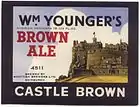Brown ale
Brown ale is a style of beer with a dark amber or brown colour. The term was first used by London brewers in the late 17th century to describe their products, such as mild ale,[1] though the term has a rather different meaning today. 18th century brown ales were lightly hopped and brewed from 100% brown malt.[2]

Today there are brown ales made in several regions, most notably England, Belgium and America. Other than being top-fermented and having a darker colour than pale beers, brown ales share little in common in terms of flavour profile. Beers termed brown ale include sweet, low alcohol beers such as Manns Original Brown Ale, medium strength amber beers of moderate bitterness such as Newcastle Brown Ale, and malty but hoppy beers such as Sierra Nevada Brown Ale.
History
In the 18th century, British brown ales were brewed to a variety of strengths, with original gravities (OG) ranging from around 1.060 to 1.090.[3] Around 1800, brewers stopped producing these types of beers as they moved away from using brown malt as a base. Pale malt, being cheaper because of its higher yield, was used as a base for all beers, including Porter and Stout.

The term "brown ale" was revived at the end of the 19th century when London brewer Mann introduced a beer with that name. However, the style only became widely brewed in the 1920s. The brown ales of this period were considerably stronger than most modern English versions. In 1926, Manns Brown Ale had an original gravity of 1.043 and an ABV of around 4%.[4] Whitbread Double Brown was even stronger, an OG of 1.054 and more than 5% ABV.[5] The introduction of these beers coincided with a big increase in demand for bottled beer in the UK. In the 1930s some breweries, such as Whitbread, introduced a second weaker and cheaper brown ale that was sometimes just a sweetened version of dark Mild. These beers had an original gravity of around 1.037.[5] After World War II, most breweries stopped producing these stronger brown ales, with the exception of some breweries in the northeast of England. The majority had an OG in the range 1.030–1.035, or around 3% ABV, much like Manns Brown Ale today.[6]
North American brown ales trace their heritage to American home brewing adaptations of certain northern English beers, and the English influence on American Colonial Ales.
Description
English brown ales range from beers such as Manns Original Brown Ale,[7] which is quite sweet and low in alcohol, to northeastern brown ale such as Newcastle Brown Ale, Double Maxim and Samuel Smith's Nut Brown Ale. North American examples include Sam Adams Brown Ale and Brooklyn Brown Ale.
They range from deep amber to brown in colour. Caramel and chocolate flavours are evident. Brown ales from northeastern England tend to be strong and malty, often nutty, while those from southern England are usually darker, sweeter and lower in alcohol. North American brown ales are usually drier than their English counterparts, with a slight citrus accent and an aroma, bitterness, and medium body due to American hop varieties. Fruitiness from esters are subdued. When chilled to cold temperatures, some haziness may be noticed.
See also
References
- David Sutla, Mild Ale, 1999, Brewers Publications, Page 26
- London and Country Brewer, Anonymous, 1736, pages 38-43.
- London and Country Brewer, Anonymous, 1736, page 36.
- Truman "Gravity Book" document number B/THB/C/252 held at the London Metropolitan Archives.
- Whitbread brewing records held at the London Metropolitan Archives.
- Whitbread Gravity Book, Document number LMA/4453/D/02/002, held at the London Metropolitan Archives.
- Manns Brown Ale - a bottle with real character Archived December 21, 2008, at the Wayback Machine